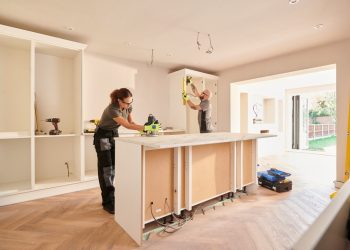For some, the surprise early November announcement from Zillow that it would permanently wind down its iBuyer operation looked like a wake-up call for the iBuying industry. Even as companies have seen exponential growth over the last year or so, plenty of insiders wondered if iBuying had really proven itself sustainable. Zillow’s failure had even more people asking: if such a large, established company could not find even short-term success in large-scale algorithmic home-flipping, wasn’t there likely something more fundamental at play?
Seemingly the answer is no—for now, at least—as Opendoor, the largest and most established iBuyer reported strong Q3 results and CEO Eric Wu promised the company remains confident in the value of iBuying going forward.
“We are pushing forward with the same speed, focus and grit that has defined us over the last 7 years,” Wu said on Opendoor’s Q3 earnings call last week.
Opendoor, founded in 2014, reported big jumps in both revenue and homes sold, up by 91% and 72% respectively over last quarter, and forecasted growth at similar levels going into Q4 and next year while cautioning the company would still be affected by a cooling real estate market.
Revenues were $2.3 billion, and the company sold just under 6,000 homes last quarter. Opendoor also purchased 15,181 homes, an increase of 79% over Q2 2021.
Staying Relevant
One of the biggest questions for Opendoor and every other iBuyer following Zillow’s tremendous misfire—where it expects to lose around $500 million due to overpaying for homes—is can they accurately and profitably predict home prices at large scale.
CFO Carrie Wheeler addressed this early on in the earnings call, referring specifically to “the news of the last few weeks.”
“We understand the importance of one, forecasting, and two, managing seasonal and macro-market changes,” she said. “We have prioritized our investments in our pricing capabilities across acquisition valuation, forecasting and retail systems since our inception.”
While Zillow has said it expects to lose 5% to 7% on its current inventory of homes, Opendoor saw revenue of around 11% per home sold in Q3 this. The company acknowledged that this result was inflated at least somewhat by the unprecedented housing market and ballooning home appreciation, with Wheeler cautioning that a more normal real estate market will look very different for Opendoor while still anticipating short- and long-term growth.
“We’re very good at this. This is core to what we do…we have seven years of investment in the data, in the modeling and in our team that allows us to continuously model and improve home price valuations,” Wheeler said.
After posting a contribution margin of 10.8% in Q2 and 7.5% in Q3 this year, Wheeler cautioned this kind of return is not realistic outside of such an unusual market, but the company expects to maintain stability here, with the hope of eventually averaging somewhere between 7% and 9% in the long term.
“We believe we can sustainability deliver a mid-single digit contribution margin of approximately 4 to 6 percent on an annual basis, given our price structure and the strength of our pricing and operational capabilities,” she said.
“Our model really works in up markets, it’s gonna work in flat markets, it’s gonna work in down markets,” she added.
If the market does cool down as expected over the next few months to a year, Wheeler said that Opendoor remains a great option for people who do not want or cannot wait while their house sits on the market for months.
Opendoor has also focused on so-called “digital consumer experiences,” according to Wu, acquiring three companies this quarter meant to expand on its ability to finance and renovate homes in a more technology-driven way.
This remains part of a long-term strategy for the leading iBuyer, reaching more consumers with more streamlined and efficient ways to quickly buy and sell houses. Though Zillow proved that there is certainly a danger of overextension, iBuying, according to Wu, is still a transformational movement in the real estate industry.
“There is a generational shift happening from offline to online, and we intend to capture this opportunity,” he said.
 Jesse Williams is RISMedia’s associate online editor. Please email him your real estate news ideas to jwilliams@rismedia.com.
Jesse Williams is RISMedia’s associate online editor. Please email him your real estate news ideas to jwilliams@rismedia.com.












